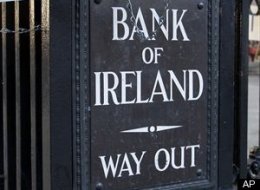
Morgan Kelly, the reluctant hero of Michael Lewis’ tale of Gaelic misadventure and Irish banking woes in March’s Vanity Fair, had the leading op-ed in Ireland Sunday warning that by agreeing to a bailout, the Irish economy has actually doomed its economy.
To recap, in 2009 the Irish government decided to nationalize four major banks facing staggering debts. If it let its banks fail, the logic went, it would scare away business. By nationalizing the banks, taxpayers get screwed, but there’s a glimmer of hope that the economy will rebound because creditors would stick around.
But in April of this year, it emerged that the amount of capital required to keep the banks solvent would be even greater than announced. The figure Kelly predicts is $250 billion — greater than Ireland’s nominal GDP (of a little over $200 billion). In other words, even if every dollar of economic output from the Irish economy went to paying off its debt, it would still face insolvency. As Kelly puts it:
“Ireland is so far into the red zone that marginal changes in the bailout terms can make no difference: we are going to be in the Hudson.”
The bailout has only put Ireland even more behind the eight-ball, Kelly argues, because the interest rate it is getting on the funds is exorbitant — although it looks like the country will get a 1 percentage point cut on its rate, to 4.8 percent from 5.8 percent this week.
His solution? Let the banks fail and cut deficit spending. But the Irish government has already rejected this prescription, saying basic social services would be stopped cold if the budget were to be slashed so dramatically.
Ultimately, it may not matter. Kelly believes Ireland now faces bankruptcy and will have to restructure its debt within two years — which, for a country labeled the Celtic Tiger just a few years ago, would be the most bitter of pills.
“For a country like Ireland that trades on its reputation as a safe place to do business, a bankruptcy would be catastrophic.”